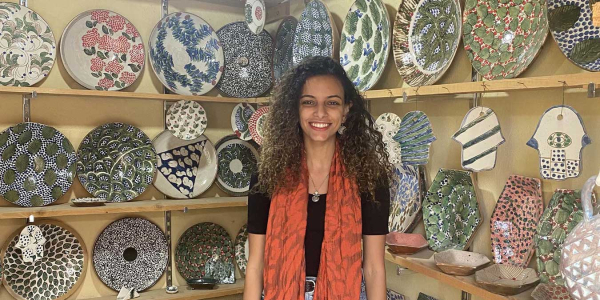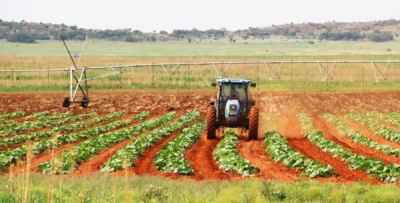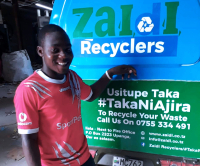
Solutions (581)
The solution was launched to boost the visibility of Egyptian handmade items and attract national and international clients for its local users.
Muqbis is an e-commerce solution launched to allow local artisans to showcase their products to an international audience. It was created, in 2021, by the Egyptian startup Muqbis.
To access its services as buyers, users need to visit its web platform where they can browse the various products ranging from pottery, embroidery, and jewelry to artwork and brass work. Once they select the items they need, they can create an account to finalize the purchase or log in if they already have a Muqbis account. As for artisans, they can register for an account that allows them to showcase their products to potential buyers.
On its front page, the solution showcases best sellers, best-rated items, and those with ongoing promotions, boosting the visibility of those items and ultimately sales. Payments can be made either with a banking card or in cash at delivery. However, for the time being, no mobile money solution is available.
Muqbis has a return policy that gives buyers 30 days from the reception date to return any defective items. Its only condition is that the item should be unused and still in the same condition as received. Let's note that in December 2022, the startup behind the solution raised funds to support its expansion.
Adoni Conrad Quenum
The solution aims to keep users healthy and prevent some diseases like obesity, diabetes, and asthma, which have recently been on the rise in Africa.
Lifesten Health is a digital solution developed by a Rwandan start-up that allows users to lead a healthy lifestyle. It creates personalized exercise and diet programs for each user.
Users can register on its web platform or via its mobile app (available for Android and iOS devices) and answer several questions to allow the solution to set up a personalized profile. Based on that profile, Lifesten Health creates "daily personalized challenges that involve activities to improve [...] diets, physical activity, and mental wellness."
Recognizing that it takes a lot of discipline to keep up with the challenges, the start-up behind the solution has come up with an incentive system that awards points to be exchanged for goods and services such as medicines, consultations, subscriptions, and even spa treatments at partner companies. Lifesten has also developed a program to encourage employers to enroll their employees to boost their productivity.
In addition, it keeps a frequently-updated blog that discusses wellness, exercise, lifestyle, diseases, and even news related to its development.
Adoni Conrad Quenum
The solution aims to help farmers and fresh produce farmers quickly sell their products while ensuring farm traceability.
Mahaseel Masr is a digital solution that connects farm owners with buyers looking for fresh products. According to Mohamed Abdel Rahman, founder of the startup behind the app, "demand for first-rate fruits and vegetables at competitive prices is showing strong growth, driven by a global rapid population increase and raised digital awareness, in addition to a demanding need for global supply chain stability." Therefore, the solution wants to facilitate secure and reliable transactions while ensuring farm traceability.
Through its Android app, the solution allows buyers and sellers to create their accounts and carry out business transactions. Buyers must type the product they need into the search bar and choose the farms offering such products depending on the location.
Mahaseel Masr claims more than 28,000 member farms and more than a million tons of crops harvested and sold. On Play Store, its Android app has been downloaded more than a hundred times.
Adoni Conrad Quenum
In urban areas, car parking is a major problem. In Nigeria, a tech company wants to address that problem with its digital solution.
Parkwell is a digital solution developed by a Nigerian startup to help drivers easily book parking spaces around Lagos.
Through its mobile app (available for Android and iOS devices), users can create accounts with their phone numbers, browse the nearest free parking spaces (thanks to GPS technology), and book spaces for set hours or days. If needed, they can extend the number of hours or days they need to continue to use the booked spaces.
According to Parkwell's website, "the total price of a reservation on Parkwell is based on either the hourly or daily rate set by the host, plus the addition of other fees or costs determined by either the Park owner or Parkwell, which might include parking insurance."
Parkwell's services can not be paid in cash. They can be paid either via itheirdigital wallet or via debit/credit cards. Currently, its Android app has been downloaded more than 500 times on PlayStore. Also, the startup has been selected to participate in the third cohort of the Africa Startup Initiative Program (ASIP)’s acceleration program that will take place in Dakar, Senegal. It will thus receive US$18,000 in equity and US$750,000 in credits, services, and in-kind contributions.
Adoni Conrad Quenum
The solution aims to make life easier for the population.
Breadfast is a digital solution developed by an Egyptian startup. It allows users to shop for food products. Since its launch in 2017, the solution has attracted US$29 million in funding for its expansion.
"We started out baking and delivering fresh bread, and today we are able to give Egyptians access to thousands of items of their basic supermarket supplies at the click of a button. Our mission is to change how people consume their daily essentials in Africa and the Middle East and, through our dynamic technology and deep understanding of the end-to-end supply chain process in the region, we are growing a simple idea into a product we believe can benefit millions of people across the MENA and Sub-Saharan regions," said Mostafa Amin, co-founder, and CEO of Breadfast.
The solution has a mobile app for Android and iOS devices. Using the app, users can sign up and start ordering the various products offered by the ecommerce solution. Currently, the startup delivers orders within an hour but, it is implementing strategies to bring delivery time to 20 minutes. One of those strategies is the extension of its store network.
In Egypt, Breadfast is really popular. Its Android app has been downloaded more than 1 million times on PlayStore and attracted over 20,000 (mostly positive) reviews. In 2019, it joined the Summer 2019 cohort of the American startup accelerator Y Combinator. After the program, the startup attracted more investors to improve its technology and establish itself in its home market.
Adoni Conrad Quenum
The solution acts as a neobank and at the same time helps dealers manage their operations.
Shekel Mobility is a digital solution developed by a Nigerian startup to provide the tools and resources needed for emerging automotive companies to grow sustainably and optimally. It enables dealers using the solution to easily send and receive money and pay bills.
"Intending to empower businesses from around the world, Shekel provides financial services to local dealers as well as virtual dealers, enabling cross-border transactions and connections made easier by an ecosystem built with end-to-end security," the solution informs on its website.
Currently, it has no mobile app. Its services are accessible only through its website, after registration. The startup provides up to US$200,000 in unsecured loans to users who want to start selling cars.
Interest on these loans is calculated weekly and the principal is to be repaid 45 days after the cars are sold. The process can be repeated as many times as needed, allowing users to dynamize their operations and boost turnover.
Shekel currently claims 1,102 registered dealers, 3,400 cars traded and over US$19 million in transactions powered. It has been selected to participate in the 2023 Winter cohort of startup accelerator Y Combinator, which will give it access to potential investors. It also attracted a US$500,000 investment from the accelerator.
Adoni Conrad Quenum
Ridesharing has become a popular transport system since the onset of Uber, Yango, Bolt, and similar apps in Africa. In the sector, giant groups are trying to conquer the African market but they are faced with competition from rapidly expanding local startups.
Amigo is a carpooling solution developed by a Tunisian startup. The solution allows users to reduce transport costs.
"Amigo is a cab service based on the ridesharing model. It allows you to reduce waiting time and spend convivial moments with passengers taking the same route," the platform indicates.
The solution has a mobile application available for Android and iOS devices. To register for the services, users need to create an Amigo account. Anytime they are going out, they just need to input their destination and let the closest driver pick them up. They can also share the ride and its costs with users taking the same route in a 2-kilometer radius.
The solution often offers discounts to its users. Its aim is to help reduce costs and waiting time. It also helps reduce pollution by optimizing the number of cars circulating. The startup claims more than 500 registered cars, 10,000 trips, and more than 6,000 active users. On Playstore, its Android app has already been downloaded more than 5,000 times. The data confirms the claims made by the startup, which is set on growing market share in its origin country, Tunisia only for the time being.
Adoni Conrad Quenum
In Africa, proptech startups are not really popular as their peers in the health, finance, and agriculture industries. Nonetheless, entrepreneurs in that industry are developing innovative solutions to facilitate procedures.
Spleet is a proptech solution developed by a Nigerian startup. It helps users find the real estate properties (either for rental or acquisition) that suit them. Since its launch, in 2018, the startup behind the solution has raised over US$3.5 million to accelerate growth and enter the Ghanaian and Kenyan markets.
The solution is currently accessible only via its web platform. On the website, users can browse available properties, and create an account.
To rent a property they like, they need to register their interest, submit some personal information, and let the request be processed before payment is collected. Users can rent entire places for themselves or choose to share the spaces with other users.
The startup offers additional solutions, including low-interest and no-collateral loans to finance rent. With its service "verify", it also helps landlords and real estate agents perform proper tenant background checks before signing lease agreements. It also offers a service, "Collect," that automatically collects rent on landlords' behalf.
Adoni Conrad Quenum
The solution facilitates the collection and recycling of various kinds of waste to help mitigate global warming, which is taking its toll on the environment.
Zaidi Recyclers is a digital solution developed by a Tanzanian startup to facilitate waste collection in Dar es Salaam, Tanzania.
"E-waste pollutes soil and water once discarded in an inappropriate manner, but can also cause damage to human health and wellbeing including respiratory issues, oxidative stress, DNA damage and possibly causes various cancers," said Allen Kimambo, founder of Zaidi Recyclers.
Using its Android app, users ate their accounts, and anytime they have waste worth recycling, they can notify the startup. Whether it is electronic and electrical appliances, car batteries, waste paper and cardboard, glass bottles, or plastics, Zaidi is ready to recover them.
To increase its popularity, it ultimately plans to start paying users for the waste they help collect.
The startup claims over 2,200 waste containers collected and 700 tons of waste recycled. It estimates that its actions helped save 4,400 trees. Its ambition is to enter new cities like Dodoma, Arusha, etc, and even go international with Zambia, where it already has a partner.
Adoni Conrad Quenum
The solution has built a high education network to allow universities to access a global student market while at the same time allowing students to study at "leading universities."
Educatly is a digital solution developed by an Egyptian startup to help students access various higher education opportunities. It connects students and universities with the aim of facilitating abroad studies for students and allowing universities to reach bright students.
"Students want to have transparent access to all relevant opportunities out there while getting as personalized support as possible to reach the best possible decision. At educatly.com, users can browse through the largest up-to-date database globally with more than 120,000 higher education opportunities worldwide and filter according to their profile and preferences to find the programs most relevant for them," said Educatly co-founder and COO Abdelrahman Ayman in 2021 when the startup raised US$1 million in pre-seed funding.
The solution has a mobile application available on Android and iOS. Users need to register either as students, university representatives, or as student ambassadors.
The startup "aspires to build the world's most comprehensive educational network to showcase all schools/colleges, programs as well as scholarships, language courses, professors, students, and alumni." It claims over 100,000 students from 90 countries in its network, and partnership with 3,000 universities with more than 150,000 active users on its platform. "We leverage the latest technologies to narrow down the most relevant programs to support the decision-making process for them and offer personalized support through our network of consultants and ambassadors," Abdelrahman Ayman says.
Adoni Conrad Quenum
More...
The move aims to facilitate access to the vaccines in regions where they would otherwise be inaccessible, causing farmers a lot of harm.
Cowtribe is a digital solution developed by a Ghanaian startup. It helps farmers, in rural areas, buy animal vaccines by either dialing a USSD code, sending an SMS, or reaching out to a network of community agents. Since its launch in 2017, the startup behind the solution has raised close to US$1.4 million to support its growth.
When using the solution for the first time, farmers have to register by dialing the dedicated USSD and following the guideline. This is a simple yet effective solution since most Africans are already used to USSD technologies, which they use almost daily to check their airtime balance, buy airtime or carry out mobile money transactions.
In 2018, Cowtribe claimed over 30,000 farmers served in 120 villages, and more than 9,000 vaccine requests processed for over US$100,000 worth of vaccines sold. For Cowtribe co-founder Peter Awin, more efforts need to be made because African farmers are still losing more than US$3 billion to animal diseases.
"While farmers need a constant supply of safe vaccines that could prevent these losses, most of them live in rural and hard-to-reach places outside of the functional delivery radius. […] Providers lack visibility to efficiently coordinate the delivery of services to these farmers. Ultimately, over 70 percent of livestock vaccines manufactured never make it to the farmers who need them most," he said.
This year, the startup is working to reach a million farmers with quality and affordable vaccines. It also plans to expand into the Malian and Burkinabe markets. In 2018, it won the national phase of the Seedstars World competition.
Adoni Conrad Quenum
Mental health is a taboo subject in most African societies. Yet, according to a 2017 report by the World Health Organization, more than 29 million Africans suffer from depression.
Nguvu is an e-health solution developed by a Nigerian startup. It gives users access to mental health experts online.
"Our customers are able to communicate – via text, audio, and video – directly in-app with their therapists and are able to schedule live video sessions with their matched therapists. This is particularly useful at such a time as this, post-pandemic. The effects of the COVID-19 pandemic have made mental health therapy more important than ever," explained Joshua Koya, Nguvu's co-founder, and CEO, in December 2021.
Users can access the services offered by the e-health startup using either its Android/iOS apps or by visiting its web platform. They can register, pass a test, and eventually get connected to a therapist. They can also choose between video consultations or text therapy. Currently, the Nguvu Android app has been downloaded more than 10,000 times on Playstore.
Let's note that some of the services offered by Nguvu are free. They include for instance free mental health screening. Meanwhile, additional text therapy services cost NGN3,000 (about US$6.5) weekly, NGN10,000 monthly, NGN27,000 quarterly, and NGN100,000 annually. For video therapies, each session cost NGN7,500 while the 4-session bundle costs NGN27,000.
For the time being, Nguvu operates in Nigeria and Kenya and dreams of conquering the world in the coming years. "Our vision is to extensively build tech solutions that revolve around preventing mental disorders from happening and correcting existing disorders," Joshua Koya indicates.
Adoni Conrad Quenum
The solution aims to help users save time and cost in a context marked by accelerated digital transformation.
BuuPass is a tech solution developed by a Kenyan startup. It allows users to buy, air, and train tickets or compare the prices when multiple sellers exist.
For its co-founder Wyclife Omondi (photo, right), "It takes travelers unnecessary time and money to compare platforms while trying to book tickets. With BuuPass digitalization, both challenges are taken care of because we cut costs for users or commuters and reduce administrative overhead for bus operators by offering a fleet and parcel management solution."
The solution has an Android app that enables users to create accounts, access various features, and even pay tickets via mobile money. On PlayStore, the app has already been downloaded more than 10,000 times.
Let's note that Buupas also has an API that enables companies to get listed. Currently, Buupas claims over 9 million bus tickets sold online. Before becoming BuuPass, It was MagicBus Ticketing. Under that name, it won the 2016 Hult Prize Challenge, going home with a US$1 million check.
Adoni Conrad Quenum
Africa's fintech sector has attracted a growing volume of investments in recent years. The investments notably encourage innovation and improve financial inclusion.
APaym is a fintech startup developed by Ivorian tech company Weblogy, founded in 1998. Using QR code technologies, it helps send payments and easily manage funds.
Using its Android and iOS apps, users have to create their APaym accounts and add funds to their accounts via bank cards or mobile money to access its various services. Once they fund their APaym wallets, they can for instance pay their bills without bank cards. All they have to do is to scan the merchant's QR code and the bill will automatically be settled even if the merchant's bank is different from the buyer's.
Thanks to APaym, users can also make fee-free card-to-card transactions, and send funds directly into bank accounts in Africa, Europe, and Asia. They can also send funds to mobile money accounts in Africa or make express transfers (Express Union and Wari).
MTN Côte d'Ivoire's subscribers can use the APaym apps without internet data. The solution also has a USSD code that enables use on feature phones. Currently, the APaym Android app has been downloaded more than 50,000 times on Playstore.
Adoni Conrad Quenum















